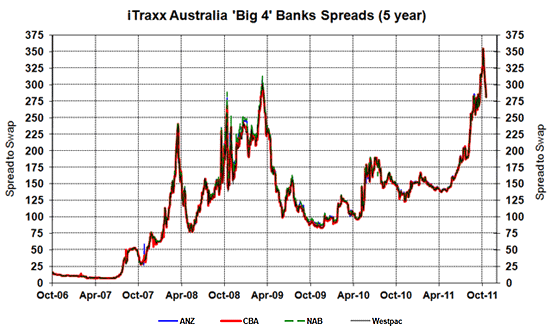
 By Roger J Kerr
By Roger J Kerr
The latest ructions and turmoil in European economies and financial markets do have direct implications for corporate borrowers in New Zealand.
While market interest rates have all moved lower around the globe as investment funds seek a safe home of Government bonds (not European!), the credit margins (or spreads) that banks pay to borrow term money have increased sharply.
In other words, the credit risk on bank primary debt issuance and bank securities trading on the secondary markets have increased as European banks come under financial/balance sheet pressure and require more capital.
Banks in Europe are refusing to place funds with each other in the inter-bank deposit market causing major disruptions to the normal order of things.
To what extent the higher credit margins the Australasian banks are being forced to pay in international debt markets right now is passed through to corporate borrowers here in New Zealand remains to be seen. However, on the surface, it has the potential to be as bad as the dramatic increases in borrowing margins seen in 2009 when the GFC hit.
Interesting insights into Australian bank funding costs in international markets came from two sources at the recent FTA Congress in Sydney.
Dr Guy Debelle, Assistant Governor Financial Markets at the Reserve Bank of Australia examined the startling increases in Credit Default Swap (“CDS”) prices for Australian banks in global markets. The iTraxx chart below confirms that the CDS pricing blew out to 350 basis points in October (since retracted to 275 basis points), levels higher than the worst pricing seen in early 2009.
However, Australian banks have recently issued 5-year Euro debt securities at only 180 basis points over swap. Dr Debelle’s explained this massive difference in pricing by suggesting that investors around the globe buy this credit insurance, via Australian bank CDS’s, as a proxy hedge against something going wrong in China.
If there is an economic shock in China, the Australian economy (thus the Aussie banks) also gets hit hard. Just proves how much all markets are now inter-related and how nervous the investment world is at this time.

Another potential major negative impact on bank funding margins over coming years is the Basel III banking regulations which require banks to hold greater amounts of liquidity and fund their books longer term - longer term funding of course coming with higher credit spreads.
Eric Williamson, Group Treasurer of National Australia Bank was of the view that even though banks do not have to be fully compliant with Basel III until 2015, Australian banks will start making adjustments to their funding positions early to be ready. He could only see bank lending margins to corporate borrowers going one way as a result.
These banking market trends appear ominous for corporate borrowers over-reliant on short-term bank borrowing in their debt portfolios.
There have been opportunities prior to and after the GFC to diversify funding risk and funding sources. One consequence of these developments is that we will see more corporate borrowers in New Zealand tapping the domestic corporate bond market where demand is strong and credit spreads lower - for example, the recent Auckland International Airport 6-year bond issue.
No chart with that title exists.
--------------------
* Roger J Kerr runs Asia Pacific Risk Management. He specialises in fixed interest securities and is a commentator on economics and markets. More commentary and useful information on fixed interest investing can be found at rogeradvice.com

We welcome your comments below. If you are not already registered, please register to comment
Remember we welcome robust, respectful and insightful debate. We don't welcome abusive or defamatory comments and will de-register those repeatedly making such comments. Our current comment policy is here.